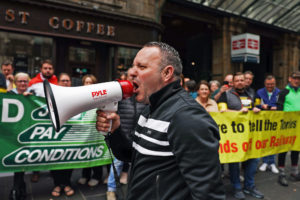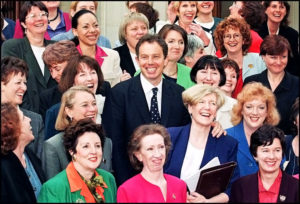It was one of the hottest summers recorded in British history. Living standards were under intense pressure from an energy crisis and rising inflation. Industrial relations across the country were breaking down. At a factory in north London, working conditions had become so intolerable that more than 100 workers, mostly of Asian and West Indian heritage, went on strike — and were promptly sacked.
The year was 1976. The factory was the Grunwick film processing plant, and strike became a cause célèbre of the British trade union movement. Dozens of Labour MPs visited the picket line. One MP, Audrey Wise, was left “black and blue” after she spotted a young woman on the picket line being dragged away by police. Wise intervened to prevent her arrest; the police dropped the woman, turned on Wise, and said: “You’ll do.” The next day photographs of the Labour MP behind bars flashed across the national papers.
A month earlier, ministers in the Labour government visited the same picket line. “We came down to show our solidarity,” Education Secretary Shirley Williams explained. One of the picketers, Mahmood Ahmad, thanked the Cabinet ministers for their “great morale boost”.
It was inevitable that the then prime minister, Jim Callaghan, would face scrutiny over his Cabinet ministers’ appearance. During Prime Minister’s Questions, John Stokes, a Conservative MP and member of the Right-wing Monday Club, rose to level the charge. He asked if Callaghan would “rebuke” his ministers for the “most unfitting action” of joining a picket line. “No, Sir,” came the prime Minister’s defiant reply. “I should have thought that the honourable gentleman would go and do the same thing.”
Almost half a century later, it is difficult to imagine Keir Starmer uttering the same words. In the current standoff over railway workers’ pay and job security, he has declared that he is “against the strikes”, going so far as to sack Shadow Transport Minister Sam Tarry after appearing on an RMT picket line. Echoing his boss, Shadow Foreign Secretary David Lammy said: “a serious party of government does not join picket lines.”
It was a remarkable display of historical illiteracy. Even the so-called Labour “modernisers” of the Eighties and Nineties did not punish their MPs for standing on the picket line. In 1988, Shadow Health Minister Harriet Harman joined nurses on a Unison picket line outside Maudsley Hospital in her constituency, and faced no rebuke from leader Neil Kinnock. A decade later, Gordon Brown’s Parliamentary Private Secretary, Don Touhig, visited a CWU picket line outside a factory in his constituency; no fuss was made. In 2006, a member of Tony Blair’s Cabinet, Hazel Blears, appeared on a Unison picket line outside a local hospital. She was criticised in the press for protesting the consequences of her own government’s health reforms, but there was no suggestion she should be sacked.
Lammy’s comment was indicative of a mindset common among Labour strategists today: that the party will lose elections if it is seen as too close to unions. Often they point to the Callaghan government’s fall in 1979, which they blame on the breakdown of industrial relations during the previous “Winter of Discontent”. Callaghan’s defence of his ministers on the Grunwick picket line is now regarded as an act of tremendous naivety.
In the following decades, modernising leaders Neil Kinnock and John Smith attempted to make some reforms to trade union power within the Labour Party, notably by reducing the unions’ voting strength in party conferences and in the selection process of parliamentary candidates and leader. Yet neither wished to challenge outright the Labour Party’s connections with the unions — they had, after all, founded the Labour Party. In his final party conference speech before his death, John Smith argued that British democracy itself “springs from…the trade union campaigns for the rights of people at work”.
When Tony Blair became leader the following year, this rhetoric quickly evaporated. Stan Greenberg, an American political consultant, told Blair that his “willingness to take on and master the unions” would be the defining feature of his leadership. Greenberg’s research found that although Labour was leading in the polls, “a third of Conservative defectors to Labour worry about excessive union influence”. What was needed was “relentless reassurance” that “the unions no longer seemed to control Labour”.
Mindful of this, Blair went to great lengths to reassure the public that the unions had little sway over the New Labour project. As one union official memorably put it, under New Labour “unions were seen as a virility test; bashing the unions was seen as macho and a way of distancing yourself from the mad auntie in the attic”. And so in the 1997 election, Blair promised that “we will not be held to ransom by the unions”, rejecting the longstanding view that the Labour Party was the “political arm of the trade union movement”. Instead, he declared, Labour was the political arm of the “British people”. Tony Benn, still a Labour MP at the time, bitterly remarked that Tony Blair was the political arm of the Daily Mail.
In government, Blair was broadly able to resist trade union influence because he found alternative means of funding the party, relying on the wealthy. During the Kinnock leadership, there would have been none of the slick Walworth Road research and PR operation without trade union money. In the early Nineties, well over three-fifths of Labour’s funding came from the trade unions. But by 1998, Blair had shrunk union revenue to just 30%, with 20% of party funds coming from the newly created “High Value Donors Unit”.
Yet Labour’s divorce from the union movement was far from finalised. As recently as 2019, Starmer himself joined a BFAWU picket line of McDonald’s workers who were on strike over low pay. It’s only in the years since that, in spite of standing on a radical manifesto when he sought to replace Jeremy Corbyn in 2020, Keir Starmer has spent his leadership renouncing Labour’s once unashamedly supportive relationship with the unions.
This is a mistake. In a YouGov poll last month, just 31% of the public said they believe Labour should distance itself from the unions in part (18%) or completely (13%). While over 80% of the public in the Callaghan years thought the unions were too powerful, just 36% did during the Corbyn years. Today, 58% of the public say the rail strikes are justified, and 66% of the public blame the Government for them.
None of which should come as a surprise. Britain, after all, is no longer living in the shadow of the Winter of Discontent and untrammelled trade-union power. Years of Thatcherite assault and New Labour neglect have seen to that. Today’s concerns are of a different order: Britain is now living in the shadow of the financial crisis and austerity; the public realm has been hollowed out; public services are not working; living standards are still below pre-financial crisis levels; the ongoing energy crisis could see households paying as much as £500 a month on their bills next winter.
There is, to put it simply, nothing like the relative prosperity and confidence of the Nineties. A failed economic model is not a bad memory; it is a living reality. Except, this time, the British public recognise that the culprit is not the power of working people but a vulture capitalism that has picked off the dying carcass of the British state. The Conservative leadership contest has descended into a Margaret Thatcher tribute act. Labour’s response to this crisis cannot be a Tony Blair tribute act. If New Labour was about meeting the politics of the moment, Starmer’s muffled response to the crisis of low pay is anything but.
Disclaimer
Some of the posts we share are controversial and we do not necessarily agree with them in the whole extend. Sometimes we agree with the content or part of it but we do not agree with the narration or language. Nevertheless we find them somehow interesting, valuable and/or informative or we share them, because we strongly believe in freedom of speech, free press and journalism. We strongly encourage you to have a critical approach to all the content, do your own research and analysis to build your own opinion.
We would be glad to have your feedback.
Source: UnHerd Read the original article here: https://unherd.com/




